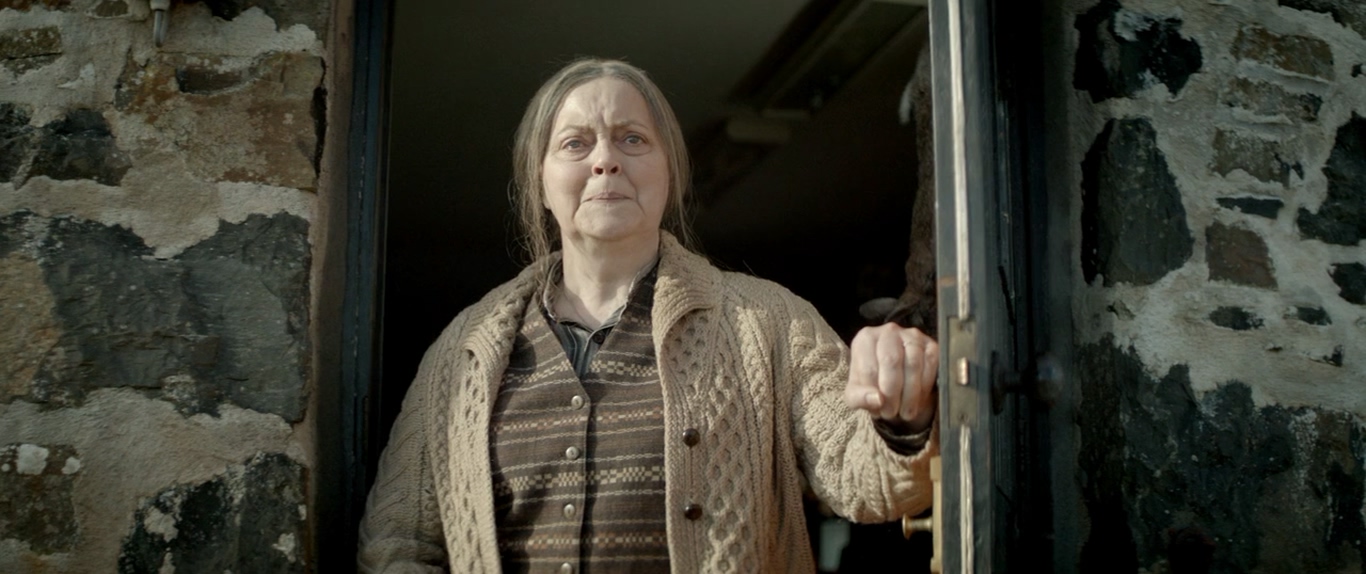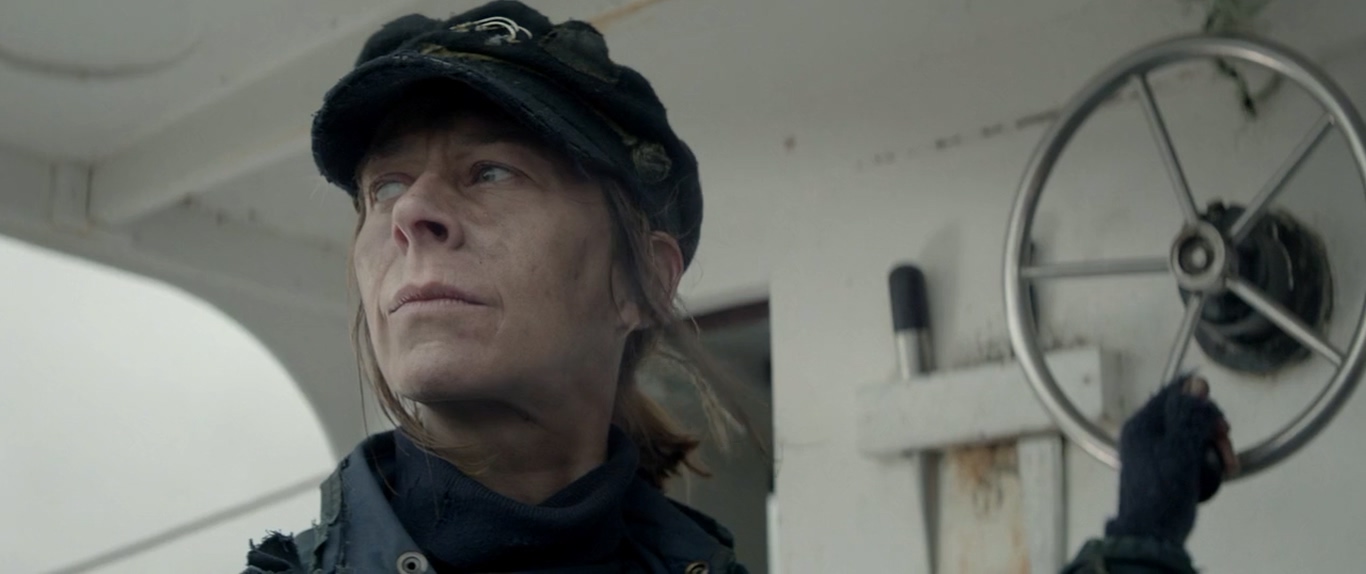No matter how much you try to run away from the guilt, it will catch up to you. It will creep up on you until your days turn into nightmares. Seemingly, that is the lesson from Russell Owen’s vividly depicted allegorical psychological horror ‘Shepherd.’ The story spins the much-used “trapped in the island” trope in favor of a refreshing take on memory and ethics.
Eric Black is trying to escape his past. He is even willing to take up a job as a shepherd on a remote island with no link to the outside world, apart from a petrifying fisherwoman who increasingly resembles the role of “Justice” in morality plays. Can Eric escape the island? Let us ponder upon the open-ended finale. SPOILERS AHEAD.
Shepherd Plot Synopsis
The story takes place in nine days and in seven chapters, which read like diary entries. In the prologue, Eric sees snippets of an accident while he longs for sleep. He is coping with the loss of his deceased wife, Rachel. After her death, his only companion is Baxter. Waking up from a nightmare, Eric pulls out the newspaper, locating a job posting for a shepherd’s role on a remote West Coast island. There are more than 600 sheep to be tended after, and the employer provides bed and board. Eric visits his mother, Glenys, who has bitter emotions towards Rachel.

Glenys thinks that Rachel ruined Eric’s life, and she holds a grudge against him for leaving his parents for Rachel. After a feud, Eric takes leave from his mother and discards the wedding ring in a nearby lake. Eric takes the ferry to the island, and the fisherwoman does not prepare him for what is to come. The bell at the lighthouse tolls even though the gates are locked, the sleepless nights stretch on, and Baxter goes missing. Eric begins having chilling and macabre hallucinations. Going by the diary of the previous shepherd, the island seems to hold more blackness than meets the eye.
Shepherd Ending Questions: Who Is The Fisherwoman? Is She A Witch?
The fisherwoman remains a mysterious character till the end, even with a supernatural air around her. On the way to the island, the fisherwoman introduces Eric to the lighthouse and the farm while asking why he considered this job. Eric replies that he wants some solitude, with which the fisherwoman resonates. A few days after Eric’s stay at the farm, Eric discovers the fisherwoman coming out of the lighthouse. He calls her, but she does not pay much heed. After being visited by a specter, who takes the form of Glenys, Eric seeks to leave the island.
Eric tries the telephone, which seems to be dead. However, the phone works fine when the fisherwoman calls Eric the following morning. Eric pleads to leave, divulging his involvement in his wife’s accident. The fisherwoman has some idea about the accident, and she also knows that Rachel was pregnant when it took place. After getting to know the whole confession from Eric, she says, “Time to begin your sentence, son.” The fisherwoman has an air of authority around her, as she often addresses Eric as “son.”

The fisherwoman also has a stuffed crow on her boat, which she ominously toys with. Considering the crow, it may seem that she is the witch from the journal of the previous shepherd. After all, witches have a long association with such black magic involving dead creatures. But we gradually realize that the fisherwoman is a neutralizing force rather than an evil one. In theory, her character resembles “Justice” from the morality plays of the middle ages, especially as she cannot see from one of her eyes. Lady Justice is also depicted as blindfolded in the popular imagination.
In another theory, she can be the personification of Wyrd (or “Fate”). You would be astonished to know that this “Wyrd” (or weird), which became figured as the “Weird Sisters” (classical Fates) in Shakespeare, took on the meaning of “supernatural” or “uncanny” in the evolution of language. When Eric is in police custody, the telephone rings, and it is the fisherwoman on the other side of the call. When Eric asks her to reveal her identity, she cryptically says, “I’m just a servant to the hand of fate.” Therefore, it would be safe to conclude that the fisherwoman represents fate and is a personification of Wyrd from Anglo-Saxon mythology.
Can Eric Leave The Island? Does He End Up In Prison?
Eric attempts to leave the island for long. After watching a series of chilling visions, Eric decides to take the situation into his own hands towards the end. After seeing the ghost of Rachel, Eric burns the house. He jumps into the water and starts swimming. However, he does not have a moment of respite as Rachel’s ghost drags him deep beneath the water. Afterward, we see Eric again in police custody. The detective interrogates Eric, who spills everything about his wife’s death. The police did not know that Eric was on the scene during the accident.

Rachel’s death occurred when Eric stepped out of the car on the cliff’s edge, and the car lost balance. Therefore, the police find reasons to convict Eric. However, as he comes out of the door of the police station, we see the pagan symbol of the island carved on the door of the police station. Nearby, one can hear the lighthouse bell tolling. Therefore, Eric still seems to be on the island. The movie suggests that whether or not the police put him in prison, he is fated to live in the cold prison of the island for long. The prison, we concur, is in Eric’s mind, and the external settings are immaterial.
After Rachel’s death, the guilt in Eric’s mind takes the form of a prison. Therefore, the serene landscape of the island comes off to Eric as a prison. Although the fisherwoman encourages Eric to make a home out of the landscape, Eric does not consider the island anything more than a prison. Seemingly, with a tainted relationship with his parents, Eric had invested a lot in Rachel. Therefore, Rachel’s death seems to be the propelling force of the horror.
The ghosts that Eric sees on the island are those of his mother and Rachel. Moreover, Eric finds the wedding ring that he had discarded elsewhere. Thus, it seems that Eric is not trying to escape from the island as much as he wants to escape his memories. Moreover, in the seclusion of the island, the memories get amplified, tormenting Eric. The movie suggests that the island represents the territory of the mind, which can make a hell of heaven.
Read More: Is Shepherd Based on a True Story?


You must be logged in to post a comment.